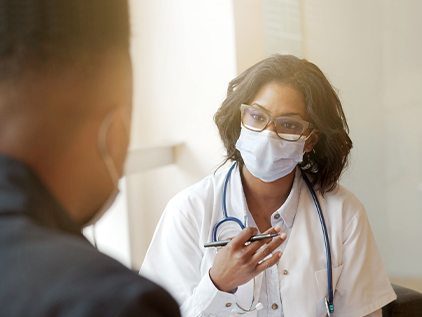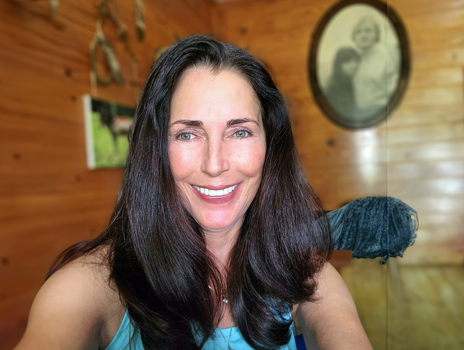- Home
- News Room
- Patient Stories Search Page
- Treatment Far from Home Helps Woman Beat Leukemia
December 29, 2023
Margie Harper lives near New Orleans, Louisiana, but it was doctors at The University of Kansas Cancer Center in Kansas City who gave her a second chance at life. In 2018, Margie was diagnosed with myelodysplastic syndrome (MDS), a form of blood cancer that causes abnormal blood cells in the bone marrow. The condition can develop into leukemia in some patients. Ten months later, in early 2019, she went in for another biopsy and was diagnosed with acute myeloid leukemia.
“With the MDS, I was pretty concerned about it taking a long time to get treatment for that,” Margie says. “And by the time they finally started my treatment, I had acute myeloid leukemia , which was devastating.”
After her leukemia diagnosis and before seeking a second opinion at The University Kansas Cancer Center, Margie received her first chemotherapy treatment in Louisiana for the disease and had a severe reaction to it. Soon after, she had a life-threatening intestinal infection – one that required a high-risk surgery.
After healing from the surgery, Margie received additional treatment in Louisiana for the leukemia. Following treatment and another biopsy, her doctors in Louisiana told her she was in remission and needed a transplant. Margie went through the process of pretransplant workups, and she was packed and ready to head to the hospital when the oncologist in Louisiana told her she was too high-risk for a transplant.
Her sister, Tina Reynolds, lives in Kansas City and was with Margie when she received that news. It was an answer neither of the women was satisfied with. Despite her many setbacks, Margie wasn’t willing to give up.
"I kept turning to Tina, looking at her like, 'What do we do?'" Margie says. "It was never, 'what do I do?' It was, 'what do we do?"
A second opinion
So the sisters went in search of a better answer, looking for someplace to get a second opinion. They found that second opinion with Joseph McGuirk, DO, division director of hematologic malignancies and cellular therapeutics at The University of Kansas Cancer Center.
Seeking a second opinion at The University of Kansas Cancer Center was a natural decision for the women. Their mother was diagnosed with a rare cancer 30 years earlier and was not expected to live. She was treated at the cancer center and was alive and well in 2022 when the sisters appeared on The University of Kansas Health System’s Morning Medical Update.
Tina scheduled Margie’s initial consultation with Dr. McGuirk, and Margie packed up and moved to Kansas City.
“The only possible hope for a cure of Margie’s leukemia was an allogeneic stem cell transplant – using somebody else as a stem cell donor,” says Dr. McGuirk. “That was the only shot we were going to have. But before we could get there, we had to get Margie into complete remission. But she had had a rough course.”

Cancer second opinion
At The University of Kansas Cancer Center, we know the value of a second opinion. It allows you and your family to ask questions and explore your options. It can ensure you get the correct diagnosis and the best treatment for your type of cancer.
Setbacks before a solution
That rough course began while Margie was still in Louisiana and before she could get to the cancer center in Kansas to see Dr. McGuirk. She experienced some scary health setbacks in addition to her leukemia diagnosis.
After learning her MDS had progressed to acute myeloid leukemia, Margie’s cancer doctors in Louisiana had a plan in place to treat the AML. She traveled to a cancer center in Louisiana, where she was going to receive her treatments and stayed in a nearby hotel.
After her initial treatment, she went back to her hotel. Before her second treatment, she had a fever that spiked and sent her to a local emergency room.
“I remember going to the ER and don’t remember anything else for about 6 weeks,” Margie says.
The fever was a result of a serious infection in her colon that had turned septic. A surgeon in Louisiana performed the surgery Margie needed, removing parts of her colon and small intestine. The surgery saved her life, but the procedure left her with an ostomy bag.
Once she healed from that surgery, she was finally able to receive her initial treatment at a cancer center in Louisiana for the AML and went into remission. However, doctors in Louisiana considered her too high-risk to receive the transplant she needed. It was at this point in her cancer journey that she came to Kansas City and The University of Kansas Cancer Center.
But in another setback, by the time her care team at the cancer center here saw her, she had relapsed again.
From hospice to hope
Because Margie had relapsed, The University of Kansas Cancer Center care team began treating her with chemotherapy, hoping she would go back into remission.
“We embarked on an intensive chemotherapy regimen, very high-risk, that unfortunately didn’t work,” say Dr. McGuirk. “The chemotherapy was making her extremely sick and after 2 rounds of treatment, she said, ‘Enough is enough.’”
Margie went home to Tina’s house and entered hospice. Family members came to visit and say their goodbyes. Despite Margie’s condition, Tina didn’t give up trying to find an answer. After about a week at Tina’s house, Margie had begun to improve and showed signs of needing a blood transfusion, so Tina took her back to the hospital.
Dr. McGuirk’s team saw them the same day, and Tina asked them about a drug she’d learned about that could help people with a certain genetic disorder in their leukemia go into remission. When she asked the team about it, they reviewed Margie’s genetic testing and learned her leukemia had that specific genetic disorder.
“We gave Margie this pill, and she is the first patient we ever treated with this brand-new medication,” Dr. McGuirk says. “We got that drug quickly and Margie went into a stunning complete remission. It’s only a small percentage of patients who would go into complete remission with this drug and she was one of them.”
From hope to healing
With her leukemia now in remission, the search began for a stem cell donor so Margie could finally get the transplant she needed. While the search was underway, Margie had a couple more rounds of chemo as well as whole-body radiation to prepare her for the transplant.
A perfect match for Margie was found on the Be The Match donor registry – a male in his mid-20s. After she received the transplant, Margie headed back to her sister’s house for the 100-day period in which she would be closely watched to be sure the transplant didn’t cause additional health issues.
The COVID-19 pandemic was in full shut-down mode by this time, which added another level of concern for Margie and Tina.
“We were very careful and took precautions,” Tina says. “The only place she went was to and from the clinic. Fortunately, Margie never got sick.”
Today, Margie is back in Louisiana living a full life and is still cancer-free. She’s in a leukemia survivors group on social media and says that it seems like every day someone asks what to do when you are told there is nothing that can be done for your cancer.
“I tell them to never give up and always get a second opinion and if you need, a third opinion,” Margie says. “You always have options. Advocate for yourself and make sure you find someone who listens to you.”
Although The University of Kansas Cancer Center was far from home, Margie has nothing but praise for Dr. McGuirk and his team.
“The University of Kansas Cancer Center was the right choice for me, and I would recommend them to anybody from anywhere in the country,” she says.
